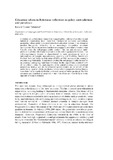Education reform in Botswana: reflections on policy contradictions and paradoxes

View/
Date
2009-02Author
Tabulawa, R.T.
Publisher
Routledge http://www.informaworld.comType
Published ArticleMetadata
Show full item recordAbstract
Literature on globalisation claims that changed global patterns of production and industrial organisation have intensified international economic competition, prompting nations globally to restructure their education systems in an attempt to position themselves favourably in an increasingly competitive economic environment. This is an environment that now requires a new kind of worker, what Castells terms the self-programmable worker. This has put education under pressure to produce the learner-equivalent of the self-programmable worker. This self-programmable learner is characterised by such psychosocial traits as independence of thought, innovativeness, creativity and flexibility. Botswana's Revised National Policy on Education (RNPE) of 1994 represents the country's response to globalisation. It purports to produce the self-programmable learner for an economy undergoing rapid transformation. In this paper I take a critical view of the policy's intent. By analysing two of its central constructs (pre-vocational preparation strategy and the behaviourist model adopted in the review of the curriculum), upon which the production of the self-programmable learner hinges, I conclude that it is unlikely that the preferred learner would be produced. The two constructs are identified as paradoxes in that their effects are most likely to be the opposite of what is intended.
